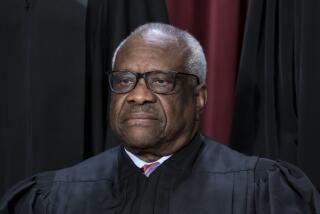Third Degree and Fifth Amendment : Judge Thomas ducks, senators grasp at straws
- Share via
The vagueness and evasiveness of Supreme Court nominee Clarence Thomas, though predictable, is nonetheless unsettling. However, the degree and nature of his elusiveness are not, so far at least, dispositive. At this point nothing Judge Thomas has said--or perhaps, more to the point, hasn’t said--to the Senate Judiciary Committee clearly disqualifies him from confirmation.
It must be understood that a confirmation hearing is not exactly a disinterested search for truth. It is a political, as well as constitutional, event. For the senators it is a chance to convert a clever one-liner into the glory of a network-news sound bite. And it is an adversarial process: the nominee in effect is the defendant.
From that perspective it should not be astonishing that the reaction of Thomas to so many questions has been to take the confirmation-hearing functional equivalent of the Fifth Amendment: Indeed, anything he might tend to say that’s too specific might very well be held against him.
Thomas’ reticence is hardly unprecedented. Justice Antonin Scalia angered many senators in 1986 because he repeatedly refused to answer questions, on the now excruciatingly familiar ground that he might face a case on the high court that dealt with similar issues. In 1987 Supreme Court nominee Anthony M. Kennedy rarely took a firm view on anything. After those hearings Sen. Patrick J. Leahy (D-Vt.) said he doubted that a single member of the panel could predict how Kennedy would vote on anything. And David Souter’s performance before the committee was so low-key that it validated the “Stealth nominee” moniker. By contrast, Justice Robert H. Bork, a nominee who was to be rejected, largely resisted White House pre-hearing coaching and answered many senators’ question directly and clearly. Look where that got him, say Thomas’ handlers today.
It must be understood that extensive confirmation hearings for a high court nominee are of relatively recent vintage. It wasn’t until this century that high court nominees began testifying before the Senate. It’s not surprising, then, that the hearing process is not yet quite a perfect instrument. Often senators’ questions are as diffuse as the nominee’s replies are evasive.
Even so, such hearings are better than nothing and at moments can be helpful. Certainly the burrowing of Sen. Joseph R. Biden Jr. (D-Del.) on the question of Thomas’ “natural law” views was riveting and revealed that some of the nominee’s publicized views from the recent past seem to be at uncomfortable odds with views he says he holds today. By contrast, Thomas’ willingness Thursday to comment specifically on important court precedents on religion and birth control but not comment on Roe vs. Wade was troubling. Sure, the wary Thomas and his handlers believe fervently in the foolhardiness of dancing with senators they believe to be wolves. But for so many Americans his elusiveness was extremely frustrating.
Thomas wants the job, and sadly, that may well mean that evasiveness, as the Bork saga showed, is a politically safer course than candor.
More to Read
Get the L.A. Times Politics newsletter
Deeply reported insights into legislation, politics and policy from Sacramento, Washington and beyond. In your inbox twice per week.
You may occasionally receive promotional content from the Los Angeles Times.










